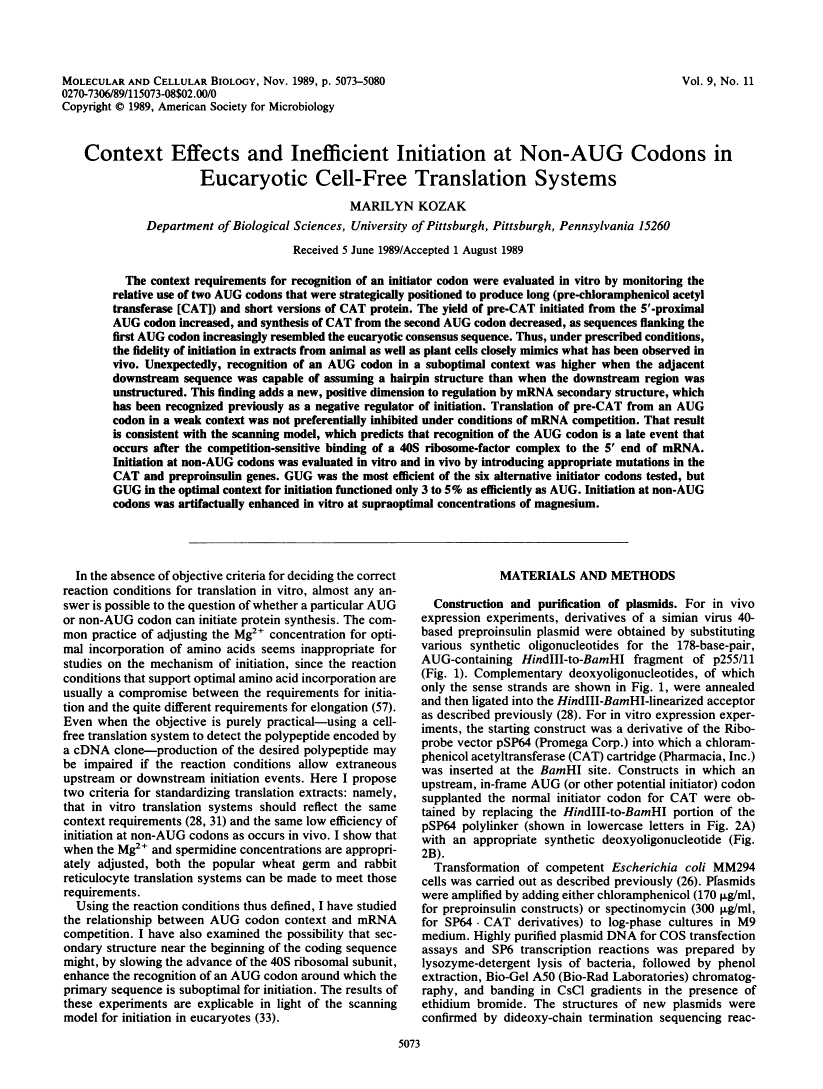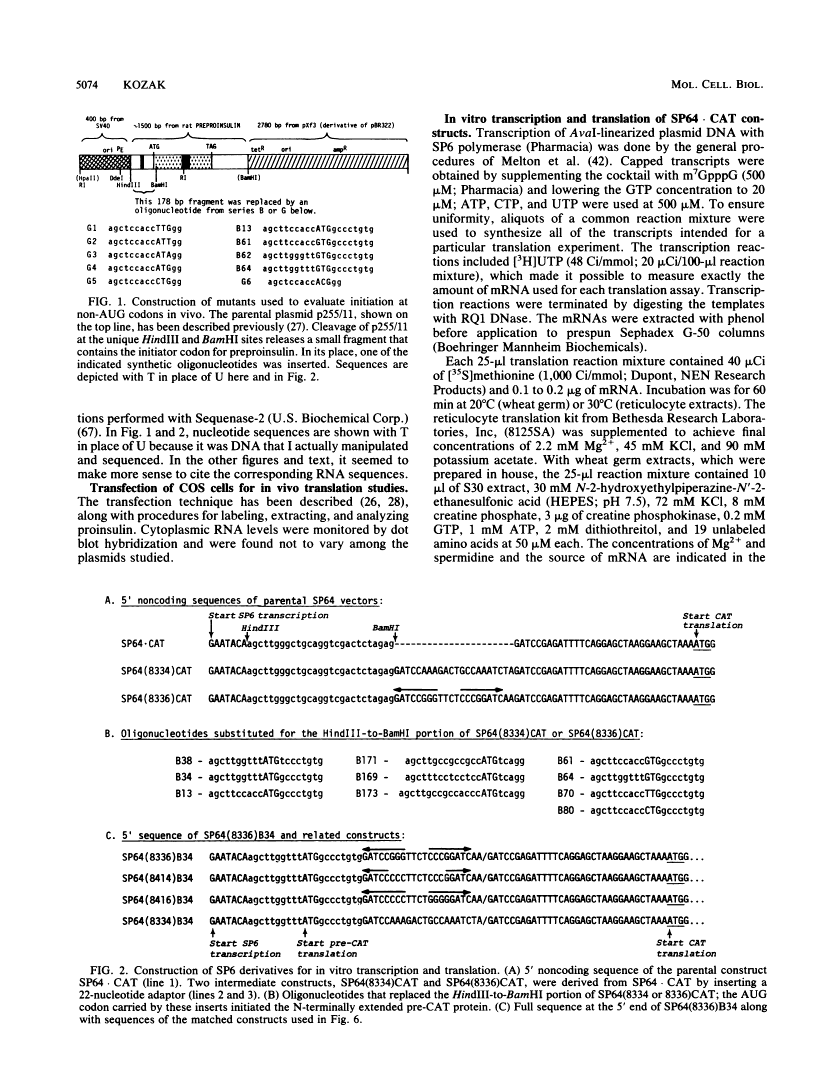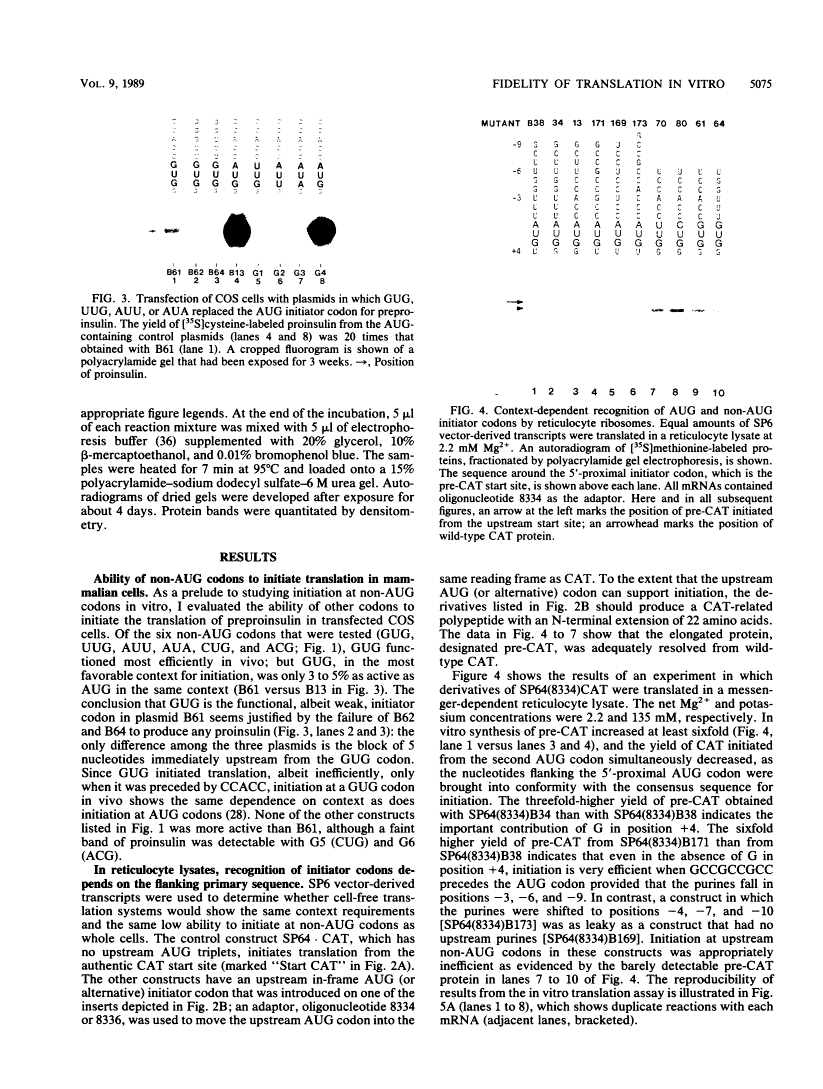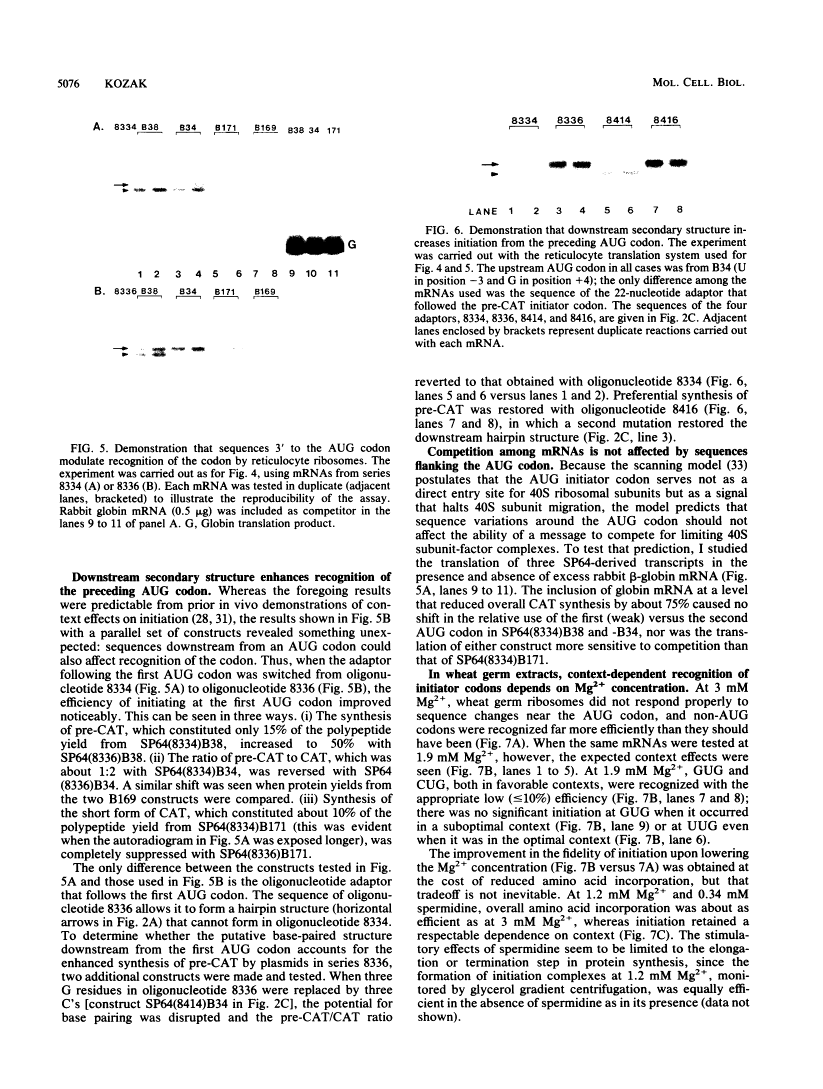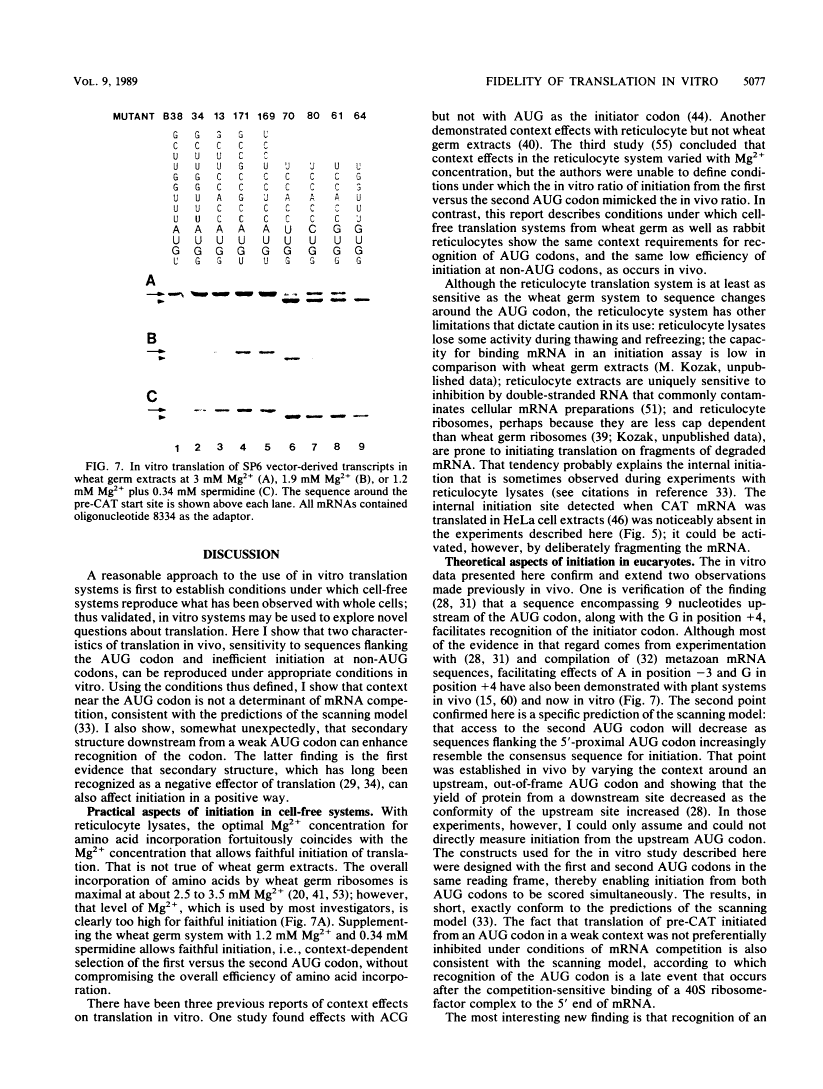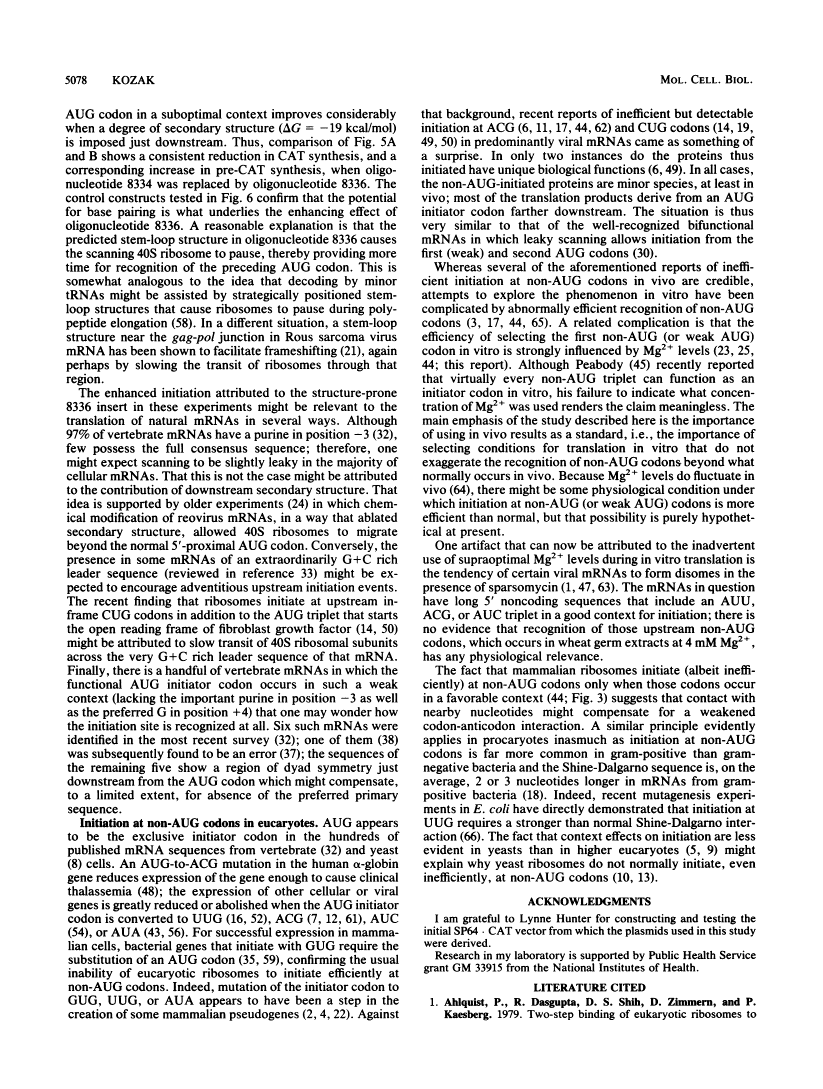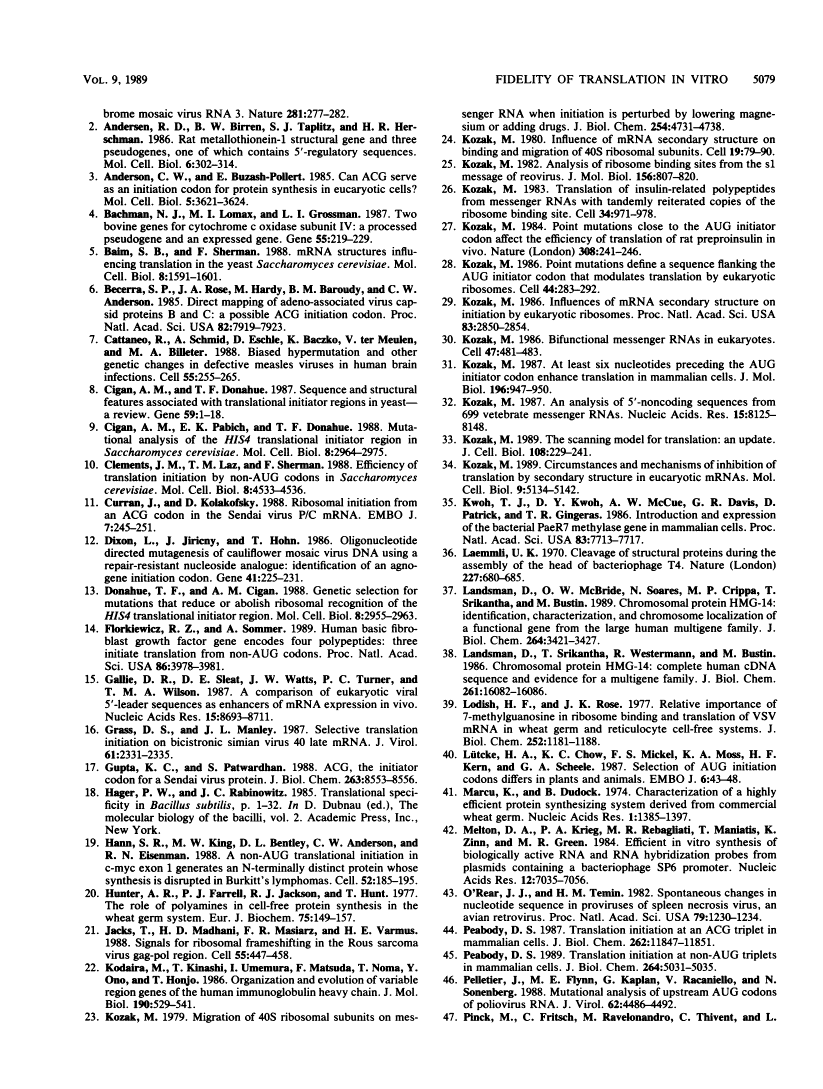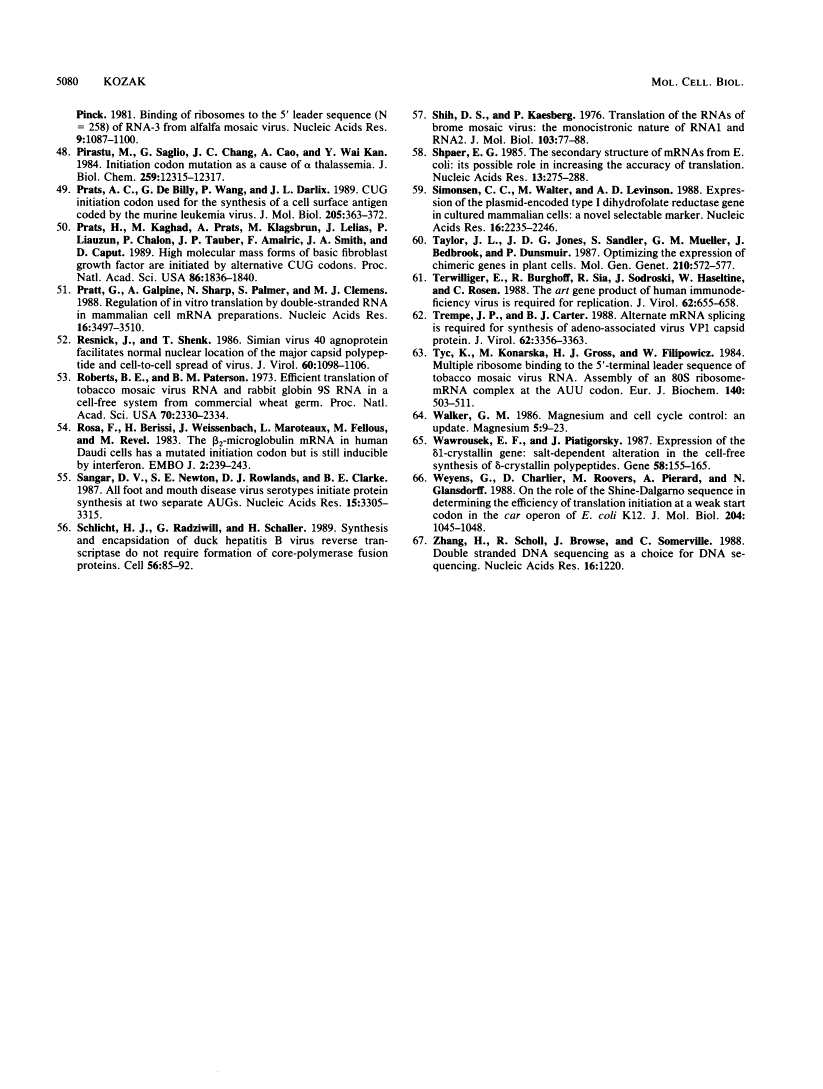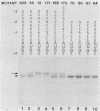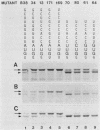Abstract
Free full text

Context effects and inefficient initiation at non-AUG codons in eucaryotic cell-free translation systems.
Abstract
The context requirements for recognition of an initiator codon were evaluated in vitro by monitoring the relative use of two AUG codons that were strategically positioned to produce long (pre-chloramphenicol acetyl transferase [CAT]) and short versions of CAT protein. The yield of pre-CAT initiated from the 5'-proximal AUG codon increased, and synthesis of CAT from the second AUG codon decreased, as sequences flanking the first AUG codon increasingly resembled the eucaryotic consensus sequence. Thus, under prescribed conditions, the fidelity of initiation in extracts from animal as well as plant cells closely mimics what has been observed in vivo. Unexpectedly, recognition of an AUG codon in a suboptimal context was higher when the adjacent downstream sequence was capable of assuming a hairpin structure than when the downstream region was unstructured. This finding adds a new, positive dimension to regulation by mRNA secondary structure, which has been recognized previously as a negative regulator of initiation. Translation of pre-CAT from an AUG codon in a weak context was not preferentially inhibited under conditions of mRNA competition. That result is consistent with the scanning model, which predicts that recognition of the AUG codon is a late event that occurs after the competition-sensitive binding of a 40S ribosome-factor complex to the 5' end of mRNA. Initiation at non-AUG codons was evaluated in vitro and in vivo by introducing appropriate mutations in the CAT and preproinsulin genes. GUG was the most efficient of the six alternative initiator codons tested, but GUG in the optimal context for initiation functioned only 3 to 5% as efficiently as AUG. Initiation at non-AUG codons was artifactually enhanced in vitro at supraoptimal concentrations of magnesium.
Full text
Full text is available as a scanned copy of the original print version. Get a printable copy (PDF file) of the complete article (1.9M), or click on a page image below to browse page by page. Links to PubMed are also available for Selected References.
Images in this article
Click on the image to see a larger version.
Selected References
These references are in PubMed. This may not be the complete list of references from this article.
- Ahlquist P, Dasgupta R, Shih DS, Zimmern D, Kaesberg P. Two-step binding of eukaryotic ribosomes to brome mosaic virus RNA3. Nature. 1979 Sep 27;281(5729):277–282. [Abstract] [Google Scholar]
- Andersen RD, Birren BW, Taplitz SJ, Herschman HR. Rat metallothionein-1 structural gene and three pseudogenes, one of which contains 5'-regulatory sequences. Mol Cell Biol. 1986 Jan;6(1):302–314. [Europe PMC free article] [Abstract] [Google Scholar]
- Anderson CW, Buzash-Pollert E. Can ACG serve as an initiation codon for protein synthesis in eucaryotic cells? Mol Cell Biol. 1985 Dec;5(12):3621–3624. [Europe PMC free article] [Abstract] [Google Scholar]
- Bachman NJ, Lomax MI, Grossman LI. Two bovine genes for cytochrome c oxidase subunit IV: a processed pseudogene and an expressed gene. Gene. 1987;55(2-3):219–229. [Abstract] [Google Scholar]
- Baim SB, Sherman F. mRNA structures influencing translation in the yeast Saccharomyces cerevisiae. Mol Cell Biol. 1988 Apr;8(4):1591–1601. [Europe PMC free article] [Abstract] [Google Scholar]
- Becerra SP, Rose JA, Hardy M, Baroudy BM, Anderson CW. Direct mapping of adeno-associated virus capsid proteins B and C: a possible ACG initiation codon. Proc Natl Acad Sci U S A. 1985 Dec;82(23):7919–7923. [Europe PMC free article] [Abstract] [Google Scholar]
- Cattaneo R, Schmid A, Eschle D, Baczko K, ter Meulen V, Billeter MA. Biased hypermutation and other genetic changes in defective measles viruses in human brain infections. Cell. 1988 Oct 21;55(2):255–265. [Europe PMC free article] [Abstract] [Google Scholar]
- Cigan AM, Donahue TF. Sequence and structural features associated with translational initiator regions in yeast--a review. Gene. 1987;59(1):1–18. [Abstract] [Google Scholar]
- Cigan AM, Pabich EK, Donahue TF. Mutational analysis of the HIS4 translational initiator region in Saccharomyces cerevisiae. Mol Cell Biol. 1988 Jul;8(7):2964–2975. [Europe PMC free article] [Abstract] [Google Scholar]
- Clements JM, Laz TM, Sherman F. Efficiency of translation initiation by non-AUG codons in Saccharomyces cerevisiae. Mol Cell Biol. 1988 Oct;8(10):4533–4536. [Europe PMC free article] [Abstract] [Google Scholar]
- Curran J, Kolakofsky D. Ribosomal initiation from an ACG codon in the Sendai virus P/C mRNA. EMBO J. 1988 Jan;7(1):245–251. [Europe PMC free article] [Abstract] [Google Scholar]
- Dixon L, Jiricny J, Hohn T. Oligonucleotide directed mutagenesis of cauliflower mosaic virus DNA using a repair-resistant nucleoside analogue: identification of an agnogene initiation codon. Gene. 1986;41(2-3):225–231. [Abstract] [Google Scholar]
- Donahue TF, Cigan AM. Genetic selection for mutations that reduce or abolish ribosomal recognition of the HIS4 translational initiator region. Mol Cell Biol. 1988 Jul;8(7):2955–2963. [Europe PMC free article] [Abstract] [Google Scholar]
- Florkiewicz RZ, Sommer A. Human basic fibroblast growth factor gene encodes four polypeptides: three initiate translation from non-AUG codons. Proc Natl Acad Sci U S A. 1989 Jun;86(11):3978–3981. [Europe PMC free article] [Abstract] [Google Scholar]
- Gallie DR, Sleat DE, Watts JW, Turner PC, Wilson TM. A comparison of eukaryotic viral 5'-leader sequences as enhancers of mRNA expression in vivo. Nucleic Acids Res. 1987 Nov 11;15(21):8693–8711. [Europe PMC free article] [Abstract] [Google Scholar]
- Grass DS, Manley JL. Selective translation initiation on bicistronic simian virus 40 late mRNA. J Virol. 1987 Jul;61(7):2331–2335. [Europe PMC free article] [Abstract] [Google Scholar]
- Gupta KC, Patwardhan S. ACG, the initiator codon for a Sendai virus protein. J Biol Chem. 1988 Jun 25;263(18):8553–8556. [Abstract] [Google Scholar]
- Hann SR, King MW, Bentley DL, Anderson CW, Eisenman RN. A non-AUG translational initiation in c-myc exon 1 generates an N-terminally distinct protein whose synthesis is disrupted in Burkitt's lymphomas. Cell. 1988 Jan 29;52(2):185–195. [Abstract] [Google Scholar]
- Hunter AR, Farrell PJ, Jackson RJ, Hunt T. The role of polyamines in cell-free protein synthesis in the wheat-germ system. Eur J Biochem. 1977 May 2;75(1):149–157. [Abstract] [Google Scholar]
- Jacks T, Madhani HD, Masiarz FR, Varmus HE. Signals for ribosomal frameshifting in the Rous sarcoma virus gag-pol region. Cell. 1988 Nov 4;55(3):447–458. [Europe PMC free article] [Abstract] [Google Scholar]
- Kodaira M, Kinashi T, Umemura I, Matsuda F, Noma T, Ono Y, Honjo T. Organization and evolution of variable region genes of the human immunoglobulin heavy chain. J Mol Biol. 1986 Aug 20;190(4):529–541. [Abstract] [Google Scholar]
- Kozak M. Migration of 40 S ribosomal subunits on messenger RNA when initiation is perturbed by lowering magnesium or adding drugs. J Biol Chem. 1979 Jun 10;254(11):4731–4738. [Abstract] [Google Scholar]
- Kozak M. Influence of mRNA secondary structure on binding and migration of 40S ribosomal subunits. Cell. 1980 Jan;19(1):79–90. [Abstract] [Google Scholar]
- Kozak M. Analysis of ribosome binding sites from the s1 message of reovirus. Initiation at the first and second AUG codons. J Mol Biol. 1982 Apr 25;156(4):807–820. [Abstract] [Google Scholar]
- Kozak M. Translation of insulin-related polypeptides from messenger RNAs with tandemly reiterated copies of the ribosome binding site. Cell. 1983 Oct;34(3):971–978. [Abstract] [Google Scholar]
- Kozak M. Point mutations close to the AUG initiator codon affect the efficiency of translation of rat preproinsulin in vivo. Nature. 1984 Mar 15;308(5956):241–246. [Abstract] [Google Scholar]
- Kozak M. Point mutations define a sequence flanking the AUG initiator codon that modulates translation by eukaryotic ribosomes. Cell. 1986 Jan 31;44(2):283–292. [Abstract] [Google Scholar]
- Kozak M. Influences of mRNA secondary structure on initiation by eukaryotic ribosomes. Proc Natl Acad Sci U S A. 1986 May;83(9):2850–2854. [Europe PMC free article] [Abstract] [Google Scholar]
- Kozak M. Bifunctional messenger RNAs in eukaryotes. Cell. 1986 Nov 21;47(4):481–483. [Abstract] [Google Scholar]
- Kozak M. At least six nucleotides preceding the AUG initiator codon enhance translation in mammalian cells. J Mol Biol. 1987 Aug 20;196(4):947–950. [Abstract] [Google Scholar]
- Kozak M. An analysis of 5'-noncoding sequences from 699 vertebrate messenger RNAs. Nucleic Acids Res. 1987 Oct 26;15(20):8125–8148. [Europe PMC free article] [Abstract] [Google Scholar]
- Kozak M. The scanning model for translation: an update. J Cell Biol. 1989 Feb;108(2):229–241. [Europe PMC free article] [Abstract] [Google Scholar]
- Kozak M. Circumstances and mechanisms of inhibition of translation by secondary structure in eucaryotic mRNAs. Mol Cell Biol. 1989 Nov;9(11):5134–5142. [Europe PMC free article] [Abstract] [Google Scholar]
- Kwoh TJ, Kwoh DY, McCue AW, Davis GR, Patrick D, Gingeras TR. Introduction and expression of the bacterial PaeR7 methylase gene in mammalian cells. Proc Natl Acad Sci U S A. 1986 Oct;83(20):7713–7717. [Europe PMC free article] [Abstract] [Google Scholar]
- Laemmli UK. Cleavage of structural proteins during the assembly of the head of bacteriophage T4. Nature. 1970 Aug 15;227(5259):680–685. [Abstract] [Google Scholar]
- Landsman D, McBride OW, Soares N, Crippa MP, Srikantha T, Bustin M. Chromosomal protein HMG-14. Identification, characterization, and chromosome localization of a functional gene from the large human multigene family. J Biol Chem. 1989 Feb 25;264(6):3421–3427. [Abstract] [Google Scholar]
- Landsman D, Srikantha T, Westermann R, Bustin M. Chromosomal protein HMG-14. Complete human cDNA sequence and evidence for a multigene family. J Biol Chem. 1986 Dec 5;261(34):16082–16086. [Abstract] [Google Scholar]
- Lodish HF, Rose JK. Relative importance of 7-methylguanosine in ribosome binding and translation of vesicular stomatitis virus mRNA in wheat germ and reticulocyte cell-free systems. J Biol Chem. 1977 Feb 25;252(4):1181–1188. [Abstract] [Google Scholar]
- Lütcke HA, Chow KC, Mickel FS, Moss KA, Kern HF, Scheele GA. Selection of AUG initiation codons differs in plants and animals. EMBO J. 1987 Jan;6(1):43–48. [Europe PMC free article] [Abstract] [Google Scholar]
- Marcu K, Dudock B. Characterization of a highly efficient protein synthesizing system derived from commercial wheat germ. Nucleic Acids Res. 1974 Nov;1(11):1385–1397. [Europe PMC free article] [Abstract] [Google Scholar]
- Melton DA, Krieg PA, Rebagliati MR, Maniatis T, Zinn K, Green MR. Efficient in vitro synthesis of biologically active RNA and RNA hybridization probes from plasmids containing a bacteriophage SP6 promoter. Nucleic Acids Res. 1984 Sep 25;12(18):7035–7056. [Europe PMC free article] [Abstract] [Google Scholar]
- O'Rear JJ, Temin HM. Spontaneous changes in nucleotide sequence in proviruses of spleen necrosis virus, an avian retrovirus. Proc Natl Acad Sci U S A. 1982 Feb;79(4):1230–1234. [Europe PMC free article] [Abstract] [Google Scholar]
- Peabody DS. Translation initiation at an ACG triplet in mammalian cells. J Biol Chem. 1987 Aug 25;262(24):11847–11851. [Abstract] [Google Scholar]
- Peabody DS. Translation initiation at non-AUG triplets in mammalian cells. J Biol Chem. 1989 Mar 25;264(9):5031–5035. [Abstract] [Google Scholar]
- Pelletier J, Flynn ME, Kaplan G, Racaniello V, Sonenberg N. Mutational analysis of upstream AUG codons of poliovirus RNA. J Virol. 1988 Dec;62(12):4486–4492. [Europe PMC free article] [Abstract] [Google Scholar]
- Pinck M, Fritsch C, Ravelonandro M, Thivent C, Pinck L. Binding of ribosomes to the 5' leader sequence (N = 258) of RNA 3 from alfalfa mosaic virus. Nucleic Acids Res. 1981 Mar 11;9(5):1087–1100. [Europe PMC free article] [Abstract] [Google Scholar]
- Pirastu M, Saglio G, Chang JC, Cao A, Kan YW. Initiation codon mutation as a cause of alpha thalassemia. J Biol Chem. 1984 Oct 25;259(20):12315–12317. [Abstract] [Google Scholar]
- Prats AC, De Billy G, Wang P, Darlix JL. CUG initiation codon used for the synthesis of a cell surface antigen coded by the murine leukemia virus. J Mol Biol. 1989 Jan 20;205(2):363–372. [Abstract] [Google Scholar]
- Prats H, Kaghad M, Prats AC, Klagsbrun M, Lélias JM, Liauzun P, Chalon P, Tauber JP, Amalric F, Smith JA, et al. High molecular mass forms of basic fibroblast growth factor are initiated by alternative CUG codons. Proc Natl Acad Sci U S A. 1989 Mar;86(6):1836–1840. [Europe PMC free article] [Abstract] [Google Scholar]
- Pratt G, Galpine A, Sharp N, Palmer S, Clemens MJ. Regulation of in vitro translation by double-stranded RNA in mammalian cell mRNA preparations. Nucleic Acids Res. 1988 Apr 25;16(8):3497–3510. [Europe PMC free article] [Abstract] [Google Scholar]
- Resnick J, Shenk T. Simian virus 40 agnoprotein facilitates normal nuclear location of the major capsid polypeptide and cell-to-cell spread of virus. J Virol. 1986 Dec;60(3):1098–1106. [Europe PMC free article] [Abstract] [Google Scholar]
- Roberts BE, Paterson BM. Efficient translation of tobacco mosaic virus RNA and rabbit globin 9S RNA in a cell-free system from commercial wheat germ. Proc Natl Acad Sci U S A. 1973 Aug;70(8):2330–2334. [Europe PMC free article] [Abstract] [Google Scholar]
- Rosa F, Berissi H, Weissenbach J, Maroteaux L, Fellous M, Revel M. The beta2-microglobulin mRNA in human Daudi cells has a mutated initiation codon but is still inducible by interferon. EMBO J. 1983;2(2):239–243. [Europe PMC free article] [Abstract] [Google Scholar]
- Sangar DV, Newton SE, Rowlands DJ, Clarke BE. All foot and mouth disease virus serotypes initiate protein synthesis at two separate AUGs. Nucleic Acids Res. 1987 Apr 24;15(8):3305–3315. [Europe PMC free article] [Abstract] [Google Scholar]
- Schlicht HJ, Radziwill G, Schaller H. Synthesis and encapsidation of duck hepatitis B virus reverse transcriptase do not require formation of core-polymerase fusion proteins. Cell. 1989 Jan 13;56(1):85–92. [Abstract] [Google Scholar]
- Shih DS, Kaesberg P. Translation of the RNAs of brome mosaic virus: the monocistronic nature of RNA1 and RNA2. J Mol Biol. 1976 May 5;103(1):77–88. [Abstract] [Google Scholar]
- Shpaer EG. The secondary structure of mRNAs from Escherichia coli: its possible role in increasing the accuracy of translation. Nucleic Acids Res. 1985 Jan 11;13(1):275–288. [Europe PMC free article] [Abstract] [Google Scholar]
- Simonsen CS, Walter M, Levinson AD. Expression of the plasmid-encoded type I dihydrofolate reductase gene in cultured mammalian cells: a novel selectable marker. Nucleic Acids Res. 1988 Mar 25;16(5):2235–2246. [Europe PMC free article] [Abstract] [Google Scholar]
- Terwilliger E, Burghoff R, Sia R, Sodroski J, Haseltine W, Rosen C. The art gene product of human immunodeficiency virus is required for replication. J Virol. 1988 Feb;62(2):655–658. [Europe PMC free article] [Abstract] [Google Scholar]
- Trempe JP, Carter BJ. Alternate mRNA splicing is required for synthesis of adeno-associated virus VP1 capsid protein. J Virol. 1988 Sep;62(9):3356–3363. [Europe PMC free article] [Abstract] [Google Scholar]
- Tyc K, Konarska M, Gross HJ, Filipowicz W. Multiple ribosome binding to the 5'-terminal leader sequence of tobacco mosaic virus RNA. Assembly of an 80S ribosome X mRNA complex at the AUU codon. Eur J Biochem. 1984 May 2;140(3):503–511. [Abstract] [Google Scholar]
- Walker GM. Magnesium and cell cycle control: an update. Magnesium. 1986;5(1):9–23. [Abstract] [Google Scholar]
- Wawrousek EF, Piatigorsky J. Expression of the delta 1-crystallin gene: salt-dependent alteration in the cell-free synthesis of delta-crystallin polypeptides. Gene. 1987;58(2-3):155–165. [Abstract] [Google Scholar]
- Weyens G, Charlier D, Roovers M, Piérard A, Glansdorff N. On the role of the Shine-Dalgarno sequence in determining the efficiency of translation initiation at a weak start codon in the car operon of Escherichia coli K12. J Mol Biol. 1988 Dec 20;204(4):1045–1048. [Abstract] [Google Scholar]
- Zhang H, Scholl R, Browse J, Somerville C. Double stranded DNA sequencing as a choice for DNA sequencing. Nucleic Acids Res. 1988 Feb 11;16(3):1220–1220. [Europe PMC free article] [Abstract] [Google Scholar]
Associated Data
Articles from Molecular and Cellular Biology are provided here courtesy of Taylor & Francis
Full text links
Read article at publisher's site: https://doi.org/10.1128/mcb.9.11.5073-5080.1989
Free after 4 months at mcb.asm.org
http://mcb.asm.org/cgi/reprint/9/11/5073
Free to read at mcb.asm.org
http://mcb.asm.org/cgi/content/abstract/9/11/5073
Citations & impact
Impact metrics
Citations of article over time
Alternative metrics

Discover the attention surrounding your research
https://www.altmetric.com/details/124521982
Smart citations by scite.ai
Explore citation contexts and check if this article has been
supported or disputed.
https://scite.ai/reports/10.1128/mcb.9.11.5073-5080.1989
Article citations
Ribosome decision graphs for the representation of eukaryotic RNA translation complexity.
Genome Res, 34(4):530-538, 15 May 2024
Cited by: 1 article | PMID: 38719470 | PMCID: PMC11146595
Modeling alternative translation initiation sites in plants reveals evolutionarily conserved cis-regulatory codes in eukaryotes.
Genome Res, 34(2):272-285, 20 Mar 2024
Cited by: 0 articles | PMID: 38479836 | PMCID: PMC10984385
N6-methyladenosine in 5' UTR does not promote translation initiation.
Mol Cell, 84(3):584-595.e6, 19 Jan 2024
Cited by: 5 articles | PMID: 38244546
Increased levels of eIF2A inhibit translation by sequestering 40S ribosomal subunits.
Nucleic Acids Res, 51(18):9983-10000, 01 Oct 2023
Cited by: 3 articles | PMID: 37602404 | PMCID: PMC10570035
Translational regulation by uORFs and start codon selection stringency.
Genes Dev, 37(11-12):474-489, 01 Jun 2023
Cited by: 30 articles | PMID: 37433636 | PMCID: PMC10393191
Review Free full text in Europe PMC
Go to all (323) article citations
Data
Similar Articles
To arrive at the top five similar articles we use a word-weighted algorithm to compare words from the Title and Abstract of each citation.
Initiation of translation by non-AUG codons in human T-cell lymphotropic virus type I mRNA encoding both Rex and Tax regulatory proteins.
Nucleic Acids Res, 28(7):1625-1634, 01 Apr 2000
Cited by: 13 articles | PMID: 10710429 | PMCID: PMC102795
Downstream secondary structure facilitates recognition of initiator codons by eukaryotic ribosomes.
Proc Natl Acad Sci U S A, 87(21):8301-8305, 01 Nov 1990
Cited by: 325 articles | PMID: 2236042 | PMCID: PMC54943
Adherence to the first-AUG rule when a second AUG codon follows closely upon the first.
Proc Natl Acad Sci U S A, 92(7):2662-2666, 01 Mar 1995
Cited by: 135 articles | PMID: 7708701 | PMCID: PMC42278
Identification of unannotated coding sequences and their physiological functions.
J Biochem, 173(4):237-242, 01 Mar 2023
Cited by: 1 article | PMID: 35959549
Review
